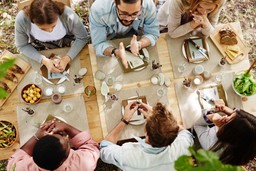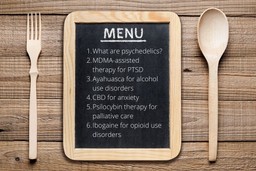Thanksgiving is the quintessential time of year when we gather for intimate conversations with our families. With psychedelics currently experiencing a renaissance, research studies are making their way into popular culture and social media spheres. There is potential for wellness treatment for a range of conditions and family members with different views, belief systems, and societal backgrounds have all benefited. This year could be an opportunity to have a conversation with your family and loved ones about psychedelic medicines and how they can help those who are suffering.
Before we take a look at how psychedelics might intersect with different family members, let’s consider how we can do our best to engage in honest and open dialogues about an edgy topic like psychedelics.
Tips for Conversations
Being mindful of body behaviors like eye contact or high-volume tones carried across dining tables can lessen tension. Susan Adcox states that words only account for 20% of our communication. Instead, Adcox advises to stay calm and use humor wisely; “Political discussions often have some inherent humor that, if recognized, can lighten the mood.” Maintaining a positive demeanor will elicit less of a debate and more opportunity for others to chime in.
Taking a moment to accept the differences prior to discussions can ease the educator’s stance and delivery. Belinda Luscombe of Time Magazine offers 4 Steps as created by Braver Angels, in utilizing therapeutic communication techniques. We are reminded how stating facts may present as pedantic and will do little to educate. The four steps of, paraphrasing, praising, pivoting, and probing offer positive connectivity. Luscombe notes we are attempting to create an emotional bond and instead of winning an argument, one can actually open up discussions.
Follow your Curiosity
Sign up to receive our free psychedelic courses, 45 page eBook, and special offers delivered to your inbox.The Kids’ Table
Adolescents have an endless imagination, and with bright personalities at the table during the holidays, families are usually prepared for colorful questions. In R. Stuart’s essay, Psychedelic Family Values, Stuart reminds adults “children consistently aim to alter their consciousness by inducing several hyperactive dizziness and whirling activities.” Surely, they have an interest in mind.
To assess their knowledge first, asking what they have heard about mind-altering substances can create a good foundation for the psychedelic educator. Psychedelic advocate and author, Rebecca Martinez states, “by helping young people develop a less sensationalized and more factual and nuanced perspective on psychedelics, we can empower them to make balanced and informed decisions as they grow up.”
Teenagers are often the first to know of substances outside of the home before adults are quick enough to control their teenager’s understanding of physical symptoms or expectations. Martinez states if a child is aware that alcoholic beverages or prescriptions alter their parent’s behavior, the association will be easily identified by them. Adolescents must know, “taking psychedelics has temporary effects on the mind and body which make it unsafe to drive or work while under the influence.” While we do not advocate for underage use of psychedelic medicines as they have not been tested in clinical trials, balanced conversations are necessary for education and harm reduction.
Martinez reminds adults to explore world histories of ceremonial use as part of the explanation, which could lessen any prior skepticism of credibility. This can segway into family histories to determine if such rituals existed in their own ancestry. Ultimately, providing references to studies on symptoms familiar to adolescents like depression and anxiety with MDMA can strengthen a teenagers’s confidence in an open and trusted dialogue with family about psychedelics.
Addiction Recovery [The Struggling Uncle]
Most families understand alcoholic repercussions to the point of it being a consistent character on Saturday Night Live. Even so, addictions are tolerated by loved ones due to the difficulty in breaking their habitual role in our lives. A recent clinical trial which was completed in 2022, showed “robust and sustained decreases” in alcohol use when using a controlled dose of psilocybin mushrooms among 93 subjects. The study shows a significant maintenance control of alcohol suppression after 32 weeks of the study. These are promising results for fighting addiction.
If this offering of a study heightens energy at the dinner table, then divert everyone’s attention to DMT’s fascinating role in inflammation control. Whether it be alcohol or the aftermath effects of a Pumpkin Pie, psychedelics likely have an important role in combating universal aches and pains from tissue inflammation. Per Attila Szabo’s paper, Effects of Psychedelics on Inflammation and Immunity, “We found that treatment of these cells with DMT or 5-MeO-DMT resulted in a marked decrease in the various inflammatory cytokines and chemokines, while strongly increasing anti-inflammatory cytokines that also possess tissue restorative and regenerative functions.” More research is needed to see how and if this works in humans.
PTSD Recovery [The Quiet Cousin]
This important meal is honoring the traditions of American history which have been bravely protected for us by our veterans. It would be highly beneficial to mention supportive foundations that promote the continued necessity of research in an under-appreciated population. Our country’s veterans suffer from PTSD at an alarming rate, and we need to explore alternative treatments. Psychedelic Support collaborated with VETS to create a free eLearning course specifically for veterans and their families to learn more about psychedelic therapies.
Several non-profit organizations are now supporting veterans in attending retreats in Latin America with follow-up integration care. Veterans are thoroughly screened for all health matters and are encouraged to seek physician assessments for clearance in initiating a new psychological regimen.
Clinical trials of MDMA-assisted psychotherapy for the treatment of PTSD in veterans has shown promising results and new studies are underway to test this method with a group therapy approach.
Psychedelics and Older Adults [Grandma and Grandpa]
Older adults play a significant role in the makeup of Thanksgiving gatherings. They are the wisdom keepers or the oracles of all tribes. Palliative care often enters conversations in the form of stress about financial matters and general anxiety around death. Discussing psychedelics’ role in helping with the complexity and difficulty of end-of-life challenges and embracing impermanence is a little more interesting than talking turkey.
A 2021 paper published at the National Library of Medicine reviewed 33 articles of studies consisting of treatment for multiple mental health issues in patients with terminal illnesses. Data revealed, “trials with LSD, psilocybin, ketamine, and MDMA are of higher methodological quality and indicate positive effects on existential and spiritual well-being, quality of life, acceptance, and reduction of anxiety and depression with few adverse and no serious adverse effects.”
Conversation Menu
In 2016, MAPS hosted a campaign to bring family and friends together to discuss the topic of psychedelics. The global psychedelic dinners were held all around the world and included a ‘conversation menu’ to spark discussions around psychedelics. Here is a sampling of the menu to inspire your own conversations.
Starters
Something to whet the appetite. Get to know your family, share what you know, and discover what you might have in common.
Getting to Know You: Who are you, and what do you know about psychedelic medicines? Why are you excited about psychedelic research, and is there an area you are particularly interested in?
Touching Base: What do you know about current psychedelic research? How did you first learn about psychedelics?
Prepare for Take-Off: Do you know people who have benefited from the careful use of psychedelics? Do you know anyone who struggles with PTSD or addiction? What, if any, psychedelic experiences have you had in the past? Do you feel they were positive, difficult, or some combination of both?
Main Course
Time to delve deeper into your experiences and share what you all know about psychedelic medicines.
The star of the gathering: Dig deep and share your own experiences. Find out if others have had similar experiences. Explore what happens when we’re not afraid to share our experiences.
Everybody Knows Someone: Do you have friends, neighbors, or relatives with PTSD? Have you heard of people who have benefited from psychedelic therapy?
Lend a Helping Hand: How have psychedelics helped you, or people you know? Why do you support making psychedelic therapy a legal treatment? How have you participated, or plan to participate in the psychedelic movement?
Nothing Like the First Time: What was your first experience with psychedelics? What did you learn from that experience, and how did you grow?
Let There Be Light: Do you know anyone who has been harmed as a result of prohibitionist drug policies? How could current laws surrounding psychedelics and marijuana be changed to support their safe and beneficial uses?
Not Always Butterflies and Roses: Have you or anyone you know had a difficult experience with psychedelics? Could the Zendo Project or other harm reduction service have helped? What resources or support would have helped?
You Might Want to Sit Down for This: Have you had challenging conversations about psychedelics? How do you talk to people about psychedelics, who aren’t open to the topic?
It’s Bigger Than You and Me: Do psychedelics have a role in your culture? If so, what is their role? Have you experienced cultures where the role of psychedelics was different?
Sides
Interesting topics to supplement the main course. Mix, match, and create your own customized conversations.
Psychedelics and Therapy: What impact could psychedelics have on conventional therapy?
Psychedelics and Creativity: Can psychedelics affect creativity? Have you been inspired by any psychedelic art or music?
Psychedelics and Spirituality: What role do you see psychedelics having in regard to spirituality or religion?
Psychedelics and Parenting: Have psychedelics had an impact on the way you parent, or on your parents?
Psychedelics and the Betterment of Well People: What benefits could well people experience from the careful use of psychedelics?
Psychedelics and Microdosing: Is there potential scientific, medical, spiritual, or personal value in using smaller doses of psychedelics?
Psychedelics and Policy: How could making psychedelic therapy legal contribute to ending the drug war?
Dessert
Something sweet to close the gathering and stimulate further connections. Show your gratitude for your community and yourself for embarking on these conversations.
Lend a Healing Hand: Do you know someone who has benefited or healed from the use of psychedelics? Do you know someone who could?
Give Thanks: Say thank you by sharing something you’re grateful for, or something you appreciated that someone else shared.
Share Your Gifts: How can you support psychedelic research and treatments? If you’re comfortable doing so, let others know how much you’ve donated or volunteered, and why you choose to give.
Conclusion
The core benefits of these medicines are relevant to almost everyone. In earlier decades, children might have been afraid to talk about psychedelics to their parents. Television ads like, This is Your Brain on Drugs, created a world of traumatic fears. Today, the internet has widened the gaps of treatment options allowing for fear to rest and education to persist.
Even if family members have different opinions or stigmas around psychedelics, having conversations about the research and treatments can be a bridge to understand more about each other. Current scientific studies prove we carry some of these substances within us already and legal developments are enabling even more opportunities in both research and non-medical settings.
This psychedelic revolution is the opportune time to dive into the education of historically-known remedies and combine them with our individual stories and context. In fact, Thanksgiving could turn into a day where we give thanks to our neighbors while offering our freshly-grown fungi. Such an offering promotes positive or vibrant conversations among all different families and individuals, all deserving of wholeness and wellness this holiday season.








